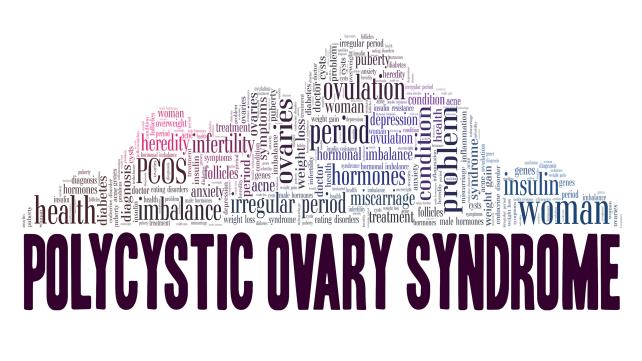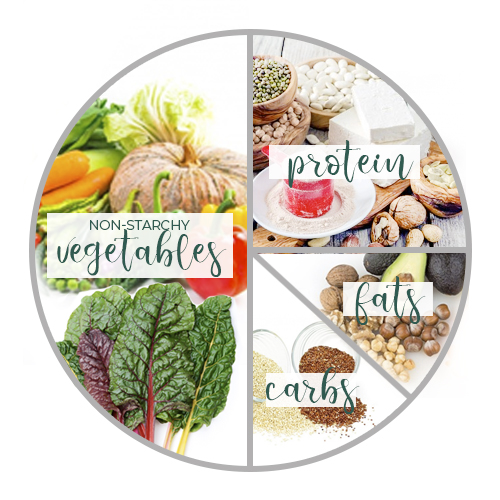
One of the most common causes of infertility in women is attributed to a condition called PCOS or Polycystic Ovary Syndrome. Statistics indicate that about 5-10% of women aged 15-44 have this condition, and most women learn about it in their 20s or 30s. This is generally when they experience an unexpected increase in their body weight or show a male pattern of hair growth, have difficulty in conceiving, or encounter complications during pregnancy. Some women can even develop this condition after having had successful pregnancies in the past.
More Details
Although medical experts have not been able to identify a definite cause of this common health problem, PCOS is generally linked to genetics and an unhealthy lifestyle which creates an imbalance of hormones that interferes with the reproductive system. In this instance, a woman's ovaries tend to become larger than normal and then develop cysts (small fluid sacs) that contain immature eggs.
Because of the hormonal imbalance, PCOS causes a woman to miss or experience irregular menstrual periods. As part of a healthy menstrual cycle, the ovaries normally produce one or mores eggs that are released each month. With PCOS, the egg may not be released as it should or the egg may not be fully developed, thereafter decreasing the chances of successful implantation of the male sperm with a fully developed egg.
PCOS and Other Health Problems
With no definite answer as to what causes the imbalance in hormones, researchers have been unable to identify if PCOS can be linked to other health problems - if these problems cause PCOS or if there are other conditions that PCOS causes. Regardless, there are certain health conditions which typically show signs in conjunction with PCOS, such as:
- Diabetes: More than half of women diagnosed with PCOS, develop:
- Glucose intolerance
- Type 2 diabetes (by the age of 40)
- Higher chances of gestational diabetes - a condition in which the blood sugar levels become high during pregnancy.
- High blood pressure: Women with PCOS are at a greater risk of having high blood pressure and are more likely to have higher levels of unhealthy cholesterol, which can become a cause for heart diseases and stroke.
- Sleep apnea: This is a sleeping disorder where breathing repeatedly stops and starts. Among women with PCOS, this condition is most likely to develop for those women who are overweight or obese. It also increases the risk of heart diseases and diabetes.
- Anxiety and Depression: Anxiety and depression are common among women with PCOS.
- Endometrial cancer. Problems with ovulation, obesity, insulin resistance, and diabetes (all common in women with PCOS) increase the risk of developing cancer of the endometrium (lining of the uterus or womb).
Breaking Free of Myths
Many women tend to presume that having PCOS means you can't get pregnant. The fact of the matter is that PCOS remains one of the most common, yet treatable, causes of infertility in women. What needs to be understood and addressed is the problem of hormonal imbalance which interferes with ovulation. Because simply put, when a woman doesn't ovulate, she can't conceive naturally.
Fortunately, there are some medicines that can help women ovulate. But it is best to consult with a specialist in reproductive medicine, also known as a fertility specialist, who can give professional advice in this regard.
Managing PCOS: Adopting a Healthy Lifestyle
In addition to the medical help that women can seek, there are also some trusted ways of managing the symptoms of PCOS by making significant changes to lifestyle. Though each case can be different, there are some general strategies women can adopt to manage the symptoms of PCOS.
1. Exercise regularly.
More than half of the women which PCOS are overweight or obese. Regular exercise can help to:
- Lose weight
- Lower cholesterol levels and decrease the risk of stroke
- Decrease insulin resistance, thereafter improving overall metabolism and balancing blood sugar levels.
- Balance hormones responsible for preventing ovaries from releasing an egg, such as high androgen levels.
It is believed that at least 120 minutes of vigorous exercise and resistance training each week can play a positive role in maintaining the overall fitness level. These should include sit-ups, push-ups, leg squats, etc. Also, the best exercises that one can do on a regular basis are brisk walking, swimming, or cycling.
There are a number of online videos available that women recommend exercises that can help manage PCOS.
2. Explore alternative medical treatments.
Research suggests that certain herbal medicines have proven effective in treating PCOS. These include cinnamon and licorice roots, which potentially help regulate ovulation and improve fertility. It is also believed that women who take herbal medication in addition to making other changes to lifestyle, witness greater improvements.
There are several other treatments that are also known to be helpful in treating PCOS. These include homeopathy, acupuncture, and ayurvedic medical treatments. These treatments help to regularize periods, reduce insulin resistance by balancing hormones, and improve chances of fertility.
3. Be mindful of your diet.

The ideal diet for women with PCOS consists of foods that are:
- Low in sugar: It is best to reduce sugar and limit carbohydrates. Refined carbohydrates (that are found in processed foods like white flour, rice, potatoes and white sugar) remove many of the other nutrients they normally carry, spike insulin levels and increase hormonal imbalances and the risk of diabetes to eat them in excess. However, since carbohydtrates are part of a balanced diet, it is best to reach out for whole grains.
- Low in fat: In order to keep the cholestrol levels in check, it is advisable to consume foods that are low in fat and that may not increase the risk of other health issues such as heart diseases or stroke. Increase intake of fish, poultry, fruits, vegetables, whole grain, and low-fat dairy produce.
- High in fiber: Women should ideally eat about 21-25 grams of fiber a day. Increasing the amount of fiber in diet will help combat insulin resistance. Foods that are high in fiber include beans, legumes, broccoli, green peas, chia seeds, whole grains, and nuts like almonds and pistachios.
- Low in the glycemic index: Women with PCOS develop insulin resistance which inhibits the natural breakdown and conversion of glucose into energy. Low glycemic index foods cause the body to release insulin slowly and steadily, making it easier for the body to use food as energy rather than allow it to be stored as fat.
- Have anti-inflammatory properties: Research suggests that women with PCOS have a type of inflammation that stimulates ovaries to produce androgens. Thus, eating foods that help fight inflammation might be useful. These include tomatoes, green leafy vegetables, fish (that are high in fatty acids like salmon, sardines, and mackerel), nuts (like almonds and walnuts), fruits (such as oranges, cherries, blueberries, and strawberries), and olive oil.
Matters relating to fertility issues are truly sensitive and more often than not often are not talked about openly. There is definitely a need to create a general awareness regarding these in order to help provide accurate information, proper guidance, and suggestions for physical and emotional support.
For Further Information
Here is a comprehensive resource with plentiful tips and advice relating to PCOS. https://www.swft.nhs.uk/application/files/8015/6586/5352/Dietary_Advice_for_Polycystic_Ovary_Syndrome_A4_2019.pdf
And, here are some useful links to help women suffering from PCOS, manage their symptoms by adopting healthy lifestyle changes.
https://www.mariongluckclinic.com/blog/foods-to-eat-with-pcos.html
https://www.youtube.com/watch?v=j3Z6jlQGrck
https://whatmollymade.com/pcos-recipes/ (Note that this list includes certain recipes which use non-halal ingredients, but these can be easily substituted for halal ones.)
Umm Ahmed is an early childhood educator and mother of three boys. Always on the quest to learn, she is passionate about seeking knowledge and passing it on to others. A writer in the making, she draws inspiration through deep conversations, laws of nature, and her own children. She and her family are currently living in Abu Dhabi, UAE.



Comments
Thank you very much for
Thank you very much for writing this article.
It's too bad that medical doctors can't draw a conclusion or speak out about to all of the unregulated chemical fragrance bombarding us. Companies use a "trade secret formula loophole" for their cheap chemical cocktails. Cheap ingredients mean more profit for companies. Stores, schools, salons, Sephora, Ulta all billowing with toxic fragrance in the air. Laundry detergents so strong, you can smell people long after they have left the room. Imagine babies breathing these chemicals in the air, in their clothes? Insane! Marketing is very effective to play on insecurities and that fragrance is key to the good life.
Fragrance can be made up of a mix of any of more than 3,500 chemicals and gives personal care, cleaning and other products their long lasting smell. This is NOT CLEAN!
These companies prey on young women who are self conscious about body odor and insecure about their value. Imaging working in one of these stores, or wearing clothing soaked in chemicals. Small children wearing clothing soaked in these toxins. The endocrine systems are being taxed. Not just PCOS but anxiety, exhaustion and inability to concentrate. Why? Because the body is trying to cope with the bombardment.
There is so much resistance to understanding that these "fragrances" are causing harm because in general, people trust the regulating systems. If it's sold in the store, it must be safe. And that is the most frustrating part. Yes we can talk about PCOS and the symptoms, but can we be aware and outraged by the cause?
I worked in the beauty industry for 30 years. The state would send reports of the dangers of nail supplies and other products that were removed from the shelves and many other hazzards of the profession. I was very sick and it took years of personal research to figure this out. The doctors gave me Accutane for the cystic acne but never tried to make a conclusion to where my endocrine system was being overloaded.
Today over 95% of perfume formulations are composed of harmful synthetic chemicals and they often contain carcinogenic chemicals, respiratory irritants, neurotoxins, narcotics, hormone disruptors, and many more.
Extensive research has linked them to diverse medical conditions including cancers, asthma, allergies, neurological issues, miscarriage, autoimmune diseases, infertility, and a range of hyperactivity disorders (ADHD) and learning disabilities
Natural Remedies For Pcos
"Thanks for sharing these natural remedies for PCOS!
Location
Add new comment